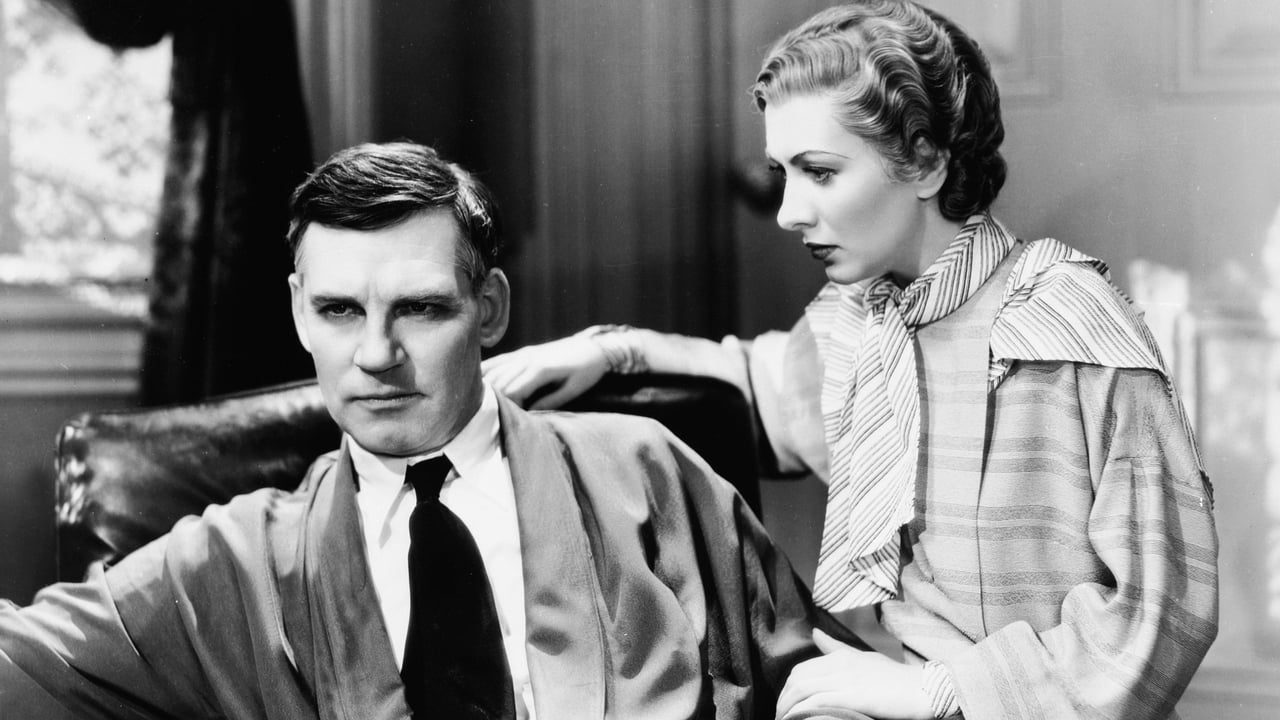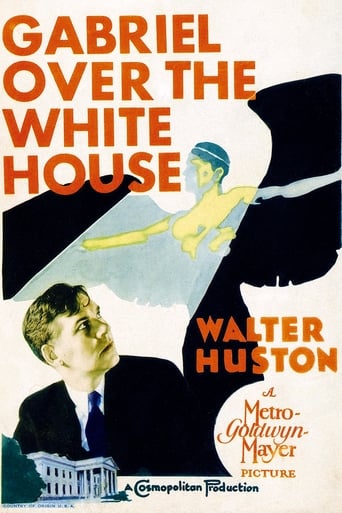Platicsco
Good story, Not enough for a whole film
Inadvands
Boring, over-political, tech fuzed mess
Neive Bellamy
Excellent and certainly provocative... If nothing else, the film is a real conversation starter.
Kien Navarro
Exactly the movie you think it is, but not the movie you want it to be.
Jimmy L.
GABRIEL OVER THE WHITE HOUSE (1933) is a movie that really tests the viewers' ideals about government and democracy. Is it meant to be inspirational? Aspirational? Frightening? A cautionary tale? It's certainly a movie that makes viewers think.Walter Huston plays Judd Hammond, newly elected President of the United States. The country is in the midst of an economic Depression, with millions out of work and starving, but President Hammond is happy to enjoy the comforts of his position while serving as a pawn of his political party. He has no intentions of fulfilling campaign promises or reforming the country. One character notes, "The right man in the White House can bring us out of despair, into prosperity again." It is clear that Judd Hammond is not the right man.But after a serious head injury, the President is reborn as a crusader for the greatest good. He takes action to help his suffering people, firing any cabinet members that stand in his way.The President could be suffering from some sort of brain damage, or perhaps Judd Hammond's body is being possessed by the angel Gabriel, God's messenger to the people. But, as Franchot Tone's character points out, is not Gabriel a messenger of Wrath?The new President Hammond starts as an idealistic reformer, but ultimately transforms the United States government into a Machiavellian dictatorship, complete with firing squads. Everything the President does is for the good of the people, but the ends cannot always justify the means. He supports the unemployed masses, promising to stimulate the economy and bring back prosperity. But when he meets opposition on Capitol Hill, he dissolves Congress and takes sole control of the government under martial law.To combat gangsterism, the President repeals Prohibition and establishes government-funded liquor stores. Violent resistance from the gangsters is seen as a declaration of war on the United States and a special police army is created to wipe out the racketeering scum.It's unclear how director Gregory La Cava wants the audience to feel about President Hammond. On the one hand, he is a champion of the people, fighting for the common man and getting results. But he is destroying the American democratic system in the process. Senators are outraged when the President threatens to dissolve Congress, and rightly so. Yet characters speak in great admiration of the President after he bullies the nations of the world into accepting his vision for international peace.Coming at a time when Americans looked to their leaders for help, GABRIEL OVER THE WHITE HOUSE might have been a Depression-era fantasy, giving audiences the strong political leader of their dreams. Or it might have been a caution of the slippery slope of government involvement. The film is fascinating and controversial from a modern vantage point. The economic stimulus idea has gained some relevance in recent years, though the shadows of the fascism and Nazism to come in that decade are unsettling to see (especially portrayed in the United States).
mark.waltz
As fictional President Hamilton, the brilliant Walter Huston fights fire with fire as he goes after the concerns of Americans in the depression era U.S.A. Unemployment, government corruption and racketeers are all taken on by this president, spiritually re-awakened after a car accident. Before that, he was simply another power-thirsty bureaucrat under the thumbs of a ruthless cabinet. Made a dictator through an act of congress with complete power to tackle these issues, Huston utilizes racketeer tactics to bring the real racketeers down, eventually declaring war to collect debts from the already poor European countries.Social issues which have only gotten worse are discussed with disgust as writers try to wake up audiences to the lack of true democracy in a democratic society. Elected officials are raked over the coals as are the countless millions of dollars spent on defense (or offense depending how you look at it), while the plight of the unemployed and starving is dealt with sensitively. This holds up because it is a reminded of lessons we should have learned which we seem to ignore as time goes on, still allowing men with millions (or even more) to control the world not even remotely concerned with the prosperity of the 90%. The movie is also prophetic, ironic considering the rise of tyrants in Europe on the horizon.While the screenplay is hokey in spots, for the most part, it is dead on in its idealistic views of a world in trouble that can't be improved in the normal "business as usual" tactics. Huston is ably supported by Franchot Tone, Karen Morley, Arthur Byron, Dickie Moore (as "First Nephew") and C. Henry Gordon as a bootlegging racketeer ironically named Nick Diamond. Films like this are often derided as "Capra Corn" because their creators present an idealism that is sometimes considered unrealistic and hopeless. But as long as men are able to think for themselves and not be manipulated by those who world power unwisely, that hope will always remain that a better world can be given to the people who truly matter-the ones who toil, not dominate.
moonspinner55
Walter Huston is excellent as always portraying a Depression-era President of the United States who sees his work for the American people as just another job. He's reckless and cavalier, but after coming out of a coma brought about by a car wreck, the lazy leader suddenly reforms and gets down to business. He wants his entire Cabinet to resign and Congress to adjourn so that he can take control over the U.S. via a one-man dictatorship. Dated, though still interesting piece of political folly and impudence, written by Carey Wilson from an "anonymous" novel, was probably a timely and enjoyable picture of its day; however, with Hitler's dictatorship in Germany about to change all of Europe, the movie soon lost its novelty (and the fascist overtones and the subtle religious angle, with Huston apparently overtaken by an otherworldly spirit, likely didn't help matters). Were the filmmakers trying to say that if God has His way, America would best be ruled under Marshall Law? One can certainly enjoy the picture without having to parallel its tactics with events in world history, although some may argue this angle is the only thing which keeps the film engaging. In either event, the acting is solid (if occasionally broad), the editing is sharp, and director Gregory La Cava does striking work; his strong, provoking visual sense causes several sequences to resemble German Expressionism. **1/2 from ****
RanchoTuVu
It takes a car accident, a coma, and a bizarre recovery to shake a Harding type Republican President with a lump of coal for a heart out his complacency and actually do something about the Great Depression that's crippling the economy and threatening the democracy. We're left to wonder at what is supposedly God's will as seen by MGM and William Randolph Hearst in this masterful piece of right-wing tinted propaganda. It's hard not to like Walter Huston, but the character he becomes (or the film hints at him becoming) is a classic fascist dictator who promises to restore democracy after he's finished saving the country. Even scarier than Huston's part is that played by Franchot Tone, who could be pretty disturbing (as in his role in Phantom Lady with Ella Raines). Smiling and easy going, he could easily become ruthless, as he does when he passes out death sentences in secret military trials to immigrant hoods who run the illegal bootlegging business.

